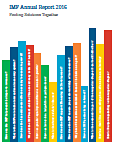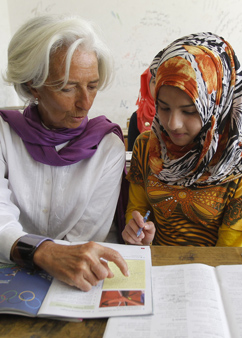FY2016 Key IMF Activities
During the financial year from May 1, 2015, to April 30, 2016, the IMF supported its membership by becoming more agile, integrated, and member focused.
Agile
- The IMF provided financing to countries affected by lower commodity prices and natural disasters.
- Knowledge on the macroeconomic implications of emerging issues, such as migration, the global trade slowdown, and income and gender inequality, has been broadened.
- Deeper analyses on structural reforms are ongoing, including a World Economic Outlook chapter highlighting the complementarity between structural reforms and macroeconomic policies.
- The adequacy of the global financial safety net and the size of the Fund are being assessed to support a more active and forward-looking dialogue on the ongoing effectiveness of the international monetary system and the IMF.
- The Fund is implementing a structured approach for capacity development in fragile states tailored to their absorptive capacity.
Integrated
- The IMF took an integrated approach to assessing transition spillovers to member countries, particularly from China’s rebalancing and global low commodity prices.
- Work on enhancing focus on macro-financial and macro-structural issues in surveillance is underway.
- The second phase of the Group of Twenty (G20) Data Gaps Initiative began in January 2016, with increased focus on risk identification, interconnections, and spillovers.
- Efforts to integrate emerging issues into surveillance continued. Analyses on climate change, gender, and inequality have been piloted in countries where these issues are macro-relevant, that is, where they may affect a country’s domestic or balance-of-payments stability.
- The IMF staff has developed a new tool to monitor disorderly market conditions, which can help inform country teams about domestic market issues and potential widespread stress.
- Synergies between surveillance and capacity development were strengthened, including in the areas of revenue mobilization, government finance statistics standards on reporting, data gathering, inclusive growth, energy.
Member Focused
- The Executive Board approved the expansion of the SDR basket to include the renminbi. IMF staff is working with SDR users and the Chinese authorities to facilitate a smooth transition to the new SDR basket in October 2016.
- The 2010 quota and governance reforms were implemented, following their acceptance by the membership. The reforms will ensure that the Fund is better able to meet and represent its members’ needs in a rapidly changing environment.
- The IMF staff continued to engage with and support various forums, including the G20 industrialized economies and Association of Southeast Asian Nations, and to organize peer-to-peer events as well as high-level seminars.
- In response to the 2014 Triennial Surveillance Review, the Fund published a paper clarifying the principles of evenhandedness governing Fund analysis and advice in surveillance.
- Technical assistance and training were scaled up in low-income countries, particularly in the areas of domestic revenue mobilization and international taxation.
- Online learning further expanded the reach of Fund training.












